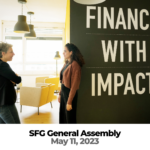
Interview of the Month: Climate Fresk
This month, we sat down with professional facilitators, Marina Protopopoff and Julien Zory, who are helping our members understand the fundamental science of climate change and biodiversity. They told us more about the Climate Fresk movement and how it’s changing the way people understand and interact with the biggest challenges of our time.
What exactly is a Fresk?
<Marina and Julien> The Climate Fresk is an interactive and collaborative workshop engaging participants to learn and change their perspectives and hopefully their behaviours on environmental and sustainability related issues.
Fostering action and building solutions requires first and foremost to understand well enough the issue !
Cedric Ringenbach, former director of The Shift Project, invented this educational set-of-cards’ concept highlighting the mechanisms of Climate Change back in 2015. Three years later the Climate Fresk nonprofit organization was created to spread the serious game, train facilitators and expand the access to the scientific knowledge.
Through the workshop, participants use a systems approach to explore key issues with the help of a set of cards explaining and illustrating the key aspects. They play in a team to draw a Fresk (a sort of collage) which summarizes the work of the Intergovernmental Panel on Climate Change (IPCC). The facilitation also invites participants to step back and set the focus on their own ecosystems as they share their reflections, perceptions, positions and questions. Then, armed with this new perspective, the group brainstorms ideas to shift away from the current model towards more sustainable alternatives. The game is open to each and everyone ; it has been initially spread out in higher education and companies (Such as Suez Environnement, the first company offering a workshop to every of its 90,000 employees worldwide).
In parallel several “Sister workshops” have developed to raise awareness on other environmental issues like Biodiversity erosion or Water scarcity and related topics such as Circular economy or sustainable IT. They provide quality education and foster empowerment for individuals, organisations and active networks to have an open, systemic and positive conversation about solutions.
We believe that the success factors of the Climate Fresks are twofold:
- from a cognitive standpoint, they offer neutrality and objectivity as they present established scientific facts.
- they also provide unique affective learning experiences ; this innovative pedagogy drives active learning and relies on the collective intelligence to explain and inspire.
Also, the facilitation enables diversity, equity, and inclusion to enrich the cooperative approach. They empower people to tackle and respond to the systemic nature of the challenges. Participants leave the workshop having formed a strong bond with each other to build bridges.
Today, one million people across the globe took part in the Climate Fresk workshop and a broader community will accelerate the understanding of climate issues at the global level. It is essential to trigger as rapidly as possible the shifts needed to preserve Life on Earth. Thrilling time…
Why did you become a facilitator of Fresks?
<Marina> I could not refuse more than twice the invitation from a friend to participate in that online workshop after a very long day during the lock-down 😉
Back then I was equipping the management team of a Chemical company with mentoring and leadership skills around active learning, collective intelligence and games. I was also part of the Green Team looking at alternatives for mobility. The workshop resonated like a storm in the mountains. You know that it is coming and you think that you are prepared enough, however you do not expect it to shock and shake up that fast and furious. Although I had been filled (and sometimes feeling literally “drowned”) with so much new scientific content, I spontaneously enrolled to become a facilitator. One week later the green team played the guinea pigs and I could keep growing and embarking very diverse teams – ranging from local elected representatives through to executive teams and even key players in the CSR and Sustainable Finance.
<Julien> I had recently completed an MBA in sustainability management, and I was already a member of The Shifters association when I discovered the climate fresk. I immediately loved the power of this tool to embark very diverse types of public, raise awareness on the climate emergency and trigger action. The workshop was not only a great asset to educate citizens around me but also a fantastic opportunity to talk about climate change in the business world. I enrolled into a facilitation training and two days later I was already facilitating my first workshop (with Marina as a coach !).
How are Fresks relevant to the finance industry?
<Marina and Julien> Finance is a major if not one of the most important and influential pillars of our current economy. If the industry has certainly engaged into a broad reflection on ESG and sustainable finance, there is no clear consensus to align everyone on the Paris Agreement and set net zero targets by 2050 across the board ; we lack successful dialogue on setting the adequate emission trajectories, and often miss proper processes to design a strategy and roadmap that would respond to the systemic challenges and encompasses social justice.
<Marina> Upskilling all Finance actors is a priority to challenge the status quo and apprehend systemic transformations. The significant learning and the collective intelligence setting is very powerful to generate different perspectives. Both the didactic and the authentic way in the facilitation support the constructive debate and deeper approach to solve the systemic challenges as an inclusive team of supportive players.
The finance industry can not only benefit from the Climate Fresk to further play a coherent part in the reduction of the CO2 emissions, it can also apprehend the transverse intricate issues and mitigate the risks – physical and transitional – as our climate and context evolve.
<Julien> Sustainable finance mechanisms currently rely on macro-level ESG metrics and corporate sustainability reports that tend to beautify the reality. I have read dozens of sustainability reports that, at a first glance, let us believe that climate mitigation is well addressed by the reporting company. But once you learn more about the science behind climate change and understand the subtleties of greenhouse gas inventory reporting, you realize that what felt like sustainable finance once isn’t really sustainable… The Climate Fresk is a great tool to enable all actors of the Finance sector to better understand these reports and distinguish genuine actions from greenwashing.
What is one thing you would like to see the finance industry do to advance action on climate?
<Marina> I believe that “when you have a healthy environment, you have a healthy economy.” (François-Philippe Champagne, Minister of Innovation, Science and Industry of Canada on the latest Agenda Dialogues).
One thing to lean towards that vision ? I could say that overall, the finance industry has yet to provide the means to support an effective transition. And this means many actions. So, I would rather encourage all relevant steps at all levels to shift financial support towards sustainable alternatives, increase transparency and education on the fossil-related evolving programs, develop alternative models and mechanisms, factor more inclusive and participatory approaches to governance, support the political agenda for systemic transformations, further democratize access to sustainable finance… And, last but not least, I believe like Hindou Oumarou Ibrahim, President, Association for Indigenous Women and Peoples of Chad (AFPAT) that “We need to invest in nature. 1% of climate finance dedicated to nature is not enough.”
<Julien> Sometimes it feels like the Financial sector has become so complex that it somehow got disconnected from the “real” economy !? We live on a planet with finite dimensions, a finite quantity of physical resources and a limited capacity for ecosystems to cope with our polluting activities. All value creating goods & services somehow rely on physical resources and energy flows that we have blindly developed too far, well beyond the planetary boundaries. The Finance industry needs to reconnect with these physical constraints in order to invest in the least impactful alternatives and enable a better future. In a sustainable word, the fiduciary duty should no longer be limited to (short term) financial returns but also incorporate the ability for life to thrive on Earth (in the future).




